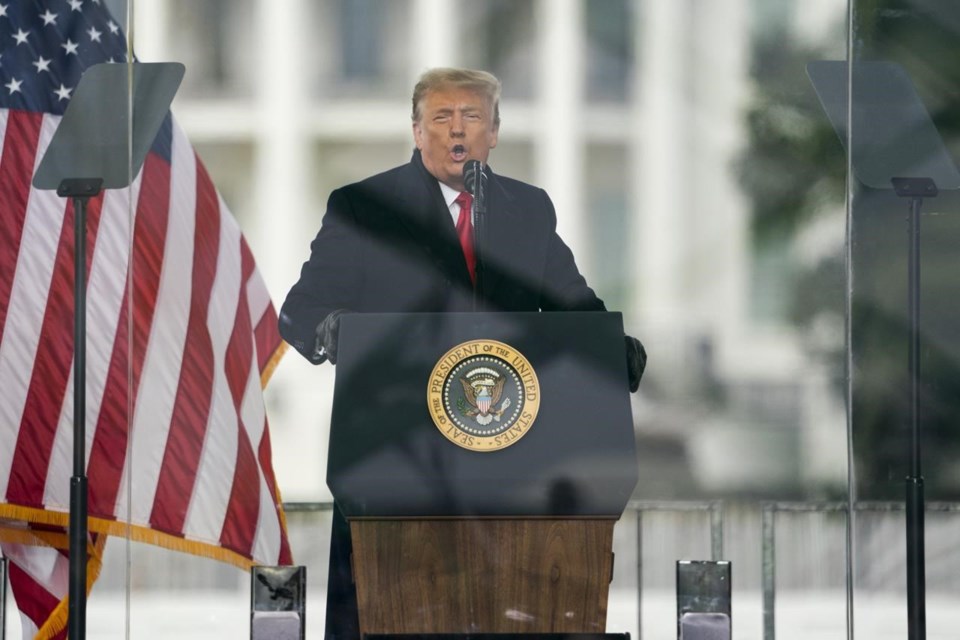WASHINGTON (AP) — Former President Donald Trump is appealing a ruling that found he is not immune from criminal prosecution as he runs out of time to delay or even derail an upcoming trial on charges that he plotted to overturn the results of the 2020 election.
Lawyers for the 2024 Republican presidential primary frontrunner filed a notice of appeal Thursday indicating that they will challenge U.S. District Judge Tanya Chutkan's decision rejecting Trump's bid to derail the case headed to trial in Washington, D.C., in March. The one-page filing was accompanied by a request from the Trump team to put the case on pause so the appeals court can take up the matter.
“The filing of President Trump’s notice of appeal has deprived this Court of jurisdiction over this case in its entirety pending resolution of the appeal,” Trump's lawyers wrote. “Therefore, a stay of all further proceedings is mandatory and automatic.”
The appeal had been expected given that Trump's lawyers had earlier signaled their plans to pursue all the way to the Supreme Court, if necessary, what they say is a legally untested question of a former president's immunity from prosecution. The argument that Trump was immune from prosecution for actions taken within his role as president had been seen as perhaps the most weighty and legally consequential objections to the case made by the Trump lawyers ahead of trial.
But now that the argument has already been rejected by the trial judge, Trump's best hope at delaying the trial appears to be convincing the D.C. Circuit or the Supreme Court to pause the case while the higher courts consider his prosecutorial immunity claim.
However, the rejection last week by a three-judge panel of the appeals court of Trump’s sweeping claims of immunity in civil cases accusing him of inciting the U.S. Capitol riot on Jan. 6, 2012, suggest he likely faces an uphill battle before that court. While it’s possible the Supreme Court may feel compelled to step in to address an unprecedented legal question, there’s also no guarantee the justices will take the case up at this stage.
And though it typically takes months for appeals to wind their way through higher courts, the D.C. Circuit and the Supreme Court could quickly resolve the question of immunity if the judges want to, said Jessica Roth, a Cardozo School of Law professor who has been following the case.
“It’s a very clean, narrow legal issue, and the issue has been fully briefed by the parties and very well laid out in the opinion so it’s not like considerable time is needed,” she said. “It’s a purely legal question that the courts could expedite and decide quickly.”
Trump's lawyers have asserted that he cannot face criminal charges because the actions spelled out in the indictment fell within his duties as president.
But Chutkan said that nothing in the Constitution nor American history justifies cloaking former presidents with immunity from prosecution for actions they took while in office.
“Defendant's four-year service as Commander in Chief did not bestow on him the divine right of kings to evade the criminal accountability that governs his fellow citizens,” Chutkan, an appointee of President Barak Obama, wrote in her ruling earlier this month.
While the Supreme Court has held that presidents are immune from civil liability for actions within the scope of their their official duties, courts have never before had to grapple with the question of whether that immunity extends to criminal prosecution.
Cheryl Bader, a former federal prosecutor, said she believes the immunity argument will be a losing battle for Trump, even before the conservative-majority Supreme Court.
“I think based on the law and there being no constitutional provision giving former presidents immunity and based on the policy that we don’t want to have former presidents being able to commit crimes ... I don’t see how this ruling gets reversed,” said Bader, head of Fordham University Law School’s Criminal Defense Clinic.
“This decision really put Trump in his place, it basically said he’s not a monarch and once he leaves office he gets no special treatment in the halls of justice,” Bader said.
The case charges Trump with conspiring to subvert the will of voters in a desperate bid to cling to power after he lost the 2020 presidential election to Democrat Joe Biden. It is the first of four criminal cases Trump is facing that's scheduled to go to trial, though it's possible the appeal of the immunity issue could delay the case.
Special counsel Jack Smith has separately charged Trump in Florida with illegally hoarding classified documents at his Mar-a-Lago estate after he left the White House. Trump is also charged in Georgia with conspiring to overturn his election loss to Biden. And he faces charges in New York related to hush money payments made during the 2016 campaign. He has denied any wrongdoing.
Alanna Durkin Richer And Eric Tucker, The Associated Press



